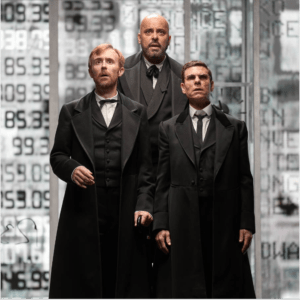The play has won five Tony Awards, been performed in New York, Sydney, Los Angeles and San Francisco, as well as worldwide via National Theatre Live, effectively attracting an audience that probably runs into the millions.
The Lehman Trilogy is on show at London’s Gillian Lynne Theatre until January 5. That is where I watched it.
In three hours and fifteen minutes (including two intervals), we witness a sweeping epic of 150 years of American history. It starts with the arrival from Bavaria of Henry Lehman to Ellis Island in New York in 1844, soon followed by his two brothers.
Henry launched a small cloth shop in Montgomery, Alabama, and from this shop grew one of the largest financial services firms in the world, Lehman Brothers Inc., which collapsed in 2008. At the time, the collapse was the largest bankruptcy in US history and triggered the global financial crisis (though the Lehman family had not been involved in the firm since 1969).
We follow three generations of Lehmans as their business changes with the ebbs and flows of the United States, from the Industrial Revolution to the Civil War and the abolition of slavery, through the development of the railroad, the opening of the New York Stock Exchange and the beginnings of Hollywood, to television and the introduction of computers into the banking industry.
From a theatrical standpoint, British director Sam Mendes (renowned for his Hollywood successes with American Beauty, 1917 and Bond films Skyfall and Spectre) opts for minimalism and flexibility. As in classic Greek tragedy, male actors play all the roles (including female characters). The three actors narrate the complex story, and a live piano providing musical commentary serves as the chorus.
The original play, written in Italian by Stefano Massini, premiered in France in 2013. It was translated into English by Mirella Cheeseman and adapted by British playwright Ben Power before it premiered in London in 2018.





